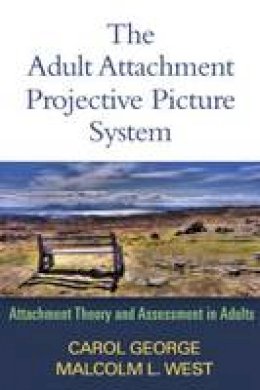
Stock image for illustration purposes only - book cover, edition or condition may vary.
The Adult Attachment Projective Picture System: Attachment Theory and Assessment in Adults
Carol George
€ 62.30
FREE Delivery in Ireland
Description for The Adult Attachment Projective Picture System: Attachment Theory and Assessment in Adults
Hardback. .
This book presents cutting-edge research on adult attachment together with a complete overview of the Adult Attachment Projective Picture System (AAP), the authors' validated developmental assessment. In addition to identifying attachment classification groups, the AAP yields important information about dimensions--including defensive processes--not evaluated by other available measures. Detailed case illustrations show what the AAP looks like in action and what it reveals about individuals' early experiences, sense of self, and capacity to engage in close, protective relationships. The AAP can be used in clinical or research settings; the concluding chapter discusses promising applications to studying the neurobiology of attachment.
Product Details
Publisher
Guilford Publications United States
Number of pages
304
Format
Hardback
Publication date
2012
Condition
New
Number of Pages
304
Place of Publication
New York, United States
ISBN
9781462504251
SKU
V9781462504251
Shipping Time
Usually ships in 4 to 8 working days
Ref
99-2
About Carol George
Carol George, PhD, is Professor of Psychology at Mills College in Oakland, California. She has been at the forefront of developing attachment assessments for children and adults, including the Attachment Doll Play Projective Assessment, the Caregiving Interview, the Adult Attachment Interview, and the AAP. Dr. George has authored numerous research articles and book chapters on adult and child attachment and caregiving, and is coeditor, with Judith Solomon, of the book Disorganized Attachment and Caregiving. She teaches courses in development and attachment, co-directs a master's-degree program in infant mental health, and trains and consults on the application of attachment assessment in research and clinical settings. Malcolm L. West, PhD, is retired Professor of Psychiatry at the University of Calgary in Alberta, Canada. Dr. West worked as a clinician and researcher throughout his career. His research has used attachment theory in clinical research, including cardiac rehabilitation patients, depression in women, and suicidal behavior in adolescents. In addition to the AAP, Dr. West has developed self-report assessments of attachment in adults and adolescents. He is coauthor, with Adrienne Sheldon-Keller, of the book Patterns of Relating: An Adult Attachment Perspective.
Reviews for The Adult Attachment Projective Picture System: Attachment Theory and Assessment in Adults
Research on patterns of adults' thoughts, memories, and feelings about intimate family relationships
especially child-parent relationships
has developed steadily and dramatically. One of the biggest challenges is developing assessment tools that successfully balance scientific precision, reliability, and validity with practical clinical utility. This volume represents the most promising attempt to meet this need that I have seen to date. I am certain this book will motivate researchers and clinicians alike to use the AAP in their work, and will become a well-worn reference.
Robert Marvin, PhD, University of Virginia, and Director, The Mary Ainsworth Child-Parent Attachment Clinic The AAP is an exciting and useful tool for research and clinical practice. George and West describe the development and major features of the AAP while also providing incisive, original contributions to contemporary attachment theory. This book is appropriate for researchers and clinicians
both experts and novices
and for graduate students. I eagerly anticipate using it in training clinicians in Therapeutic Assessment.
Stephen E. Finn, PhD, Founder, Center for Therapeutic Assessment; Department of Psychology, University of Texas at Austin This splendid, important book is grounded in a strong theory and infused with creativity. It presents an assessment method that is user friendly and economical, validated in clinical and community samples, and confirmed by neurobiological research. The book uses many case examples to illustrate adults' representations of attachment patterns. For graduate students, it is a guide to thinking beyond existing methods when asking new questions. For professionals in clinical and research settings, it opens a window to unconscious relationship biases.
Karin Grossmann, PhD, Department of Psychology, University of Regensburg, Germany
especially child-parent relationships
has developed steadily and dramatically. One of the biggest challenges is developing assessment tools that successfully balance scientific precision, reliability, and validity with practical clinical utility. This volume represents the most promising attempt to meet this need that I have seen to date. I am certain this book will motivate researchers and clinicians alike to use the AAP in their work, and will become a well-worn reference.
Robert Marvin, PhD, University of Virginia, and Director, The Mary Ainsworth Child-Parent Attachment Clinic The AAP is an exciting and useful tool for research and clinical practice. George and West describe the development and major features of the AAP while also providing incisive, original contributions to contemporary attachment theory. This book is appropriate for researchers and clinicians
both experts and novices
and for graduate students. I eagerly anticipate using it in training clinicians in Therapeutic Assessment.
Stephen E. Finn, PhD, Founder, Center for Therapeutic Assessment; Department of Psychology, University of Texas at Austin This splendid, important book is grounded in a strong theory and infused with creativity. It presents an assessment method that is user friendly and economical, validated in clinical and community samples, and confirmed by neurobiological research. The book uses many case examples to illustrate adults' representations of attachment patterns. For graduate students, it is a guide to thinking beyond existing methods when asking new questions. For professionals in clinical and research settings, it opens a window to unconscious relationship biases.
Karin Grossmann, PhD, Department of Psychology, University of Regensburg, Germany
